
What if one of the most powerful ways to stay healthier and live longer was already in your daily routine? It’s true—movement plays a vital role in how long and how well you live. Exercise impacts nearly every part of the body, from keeping your heart strong to improving your immune system and brain health.
This article dives into the fascinating connection between physical activity and longevity. You’ll learn how exercise can reduce disease risks, protect your body at the cellular level, and discover practical tips on how to bring more motion into your life.
The Science of Movement and Longevity
Reducing Mortality Risk
How much of a difference does exercise really make? Research shows that people who stay active have a remarkable 30–35% lower risk of death from all causes compared to those who lead sedentary lives (study). That translates to an extra 2–4 years of life expectancy for regular exercisers.
Even better, those added years are often spent free of chronic illnesses like heart disease and diabetes. This means exercise doesn’t just help you live longer; it helps you live better.
Protecting Your Heart
Heart disease is the world’s leading cause of death, but exercise is a powerful protector. Regular movement can significantly lower the risks of heart attacks or strokes by improving your circulation, reducing blood pressure, and keeping your arteries flexible. Studies reveal that moderate physical activity may extend life expectancy by up to four years while reducing the likelihood of heart-related conditions (source).
Boosting Immunity
Your immune system changes as you age, but regular exercise can slow down this process by fortifying your body’s defenses. Research highlights that physically active older adults experience better antibody responses after vaccines, bringing their immune function closer to that of much younger individuals (source).
Minimizing Chronic Inflammation
Inflammation is a hidden driver of diseases like arthritis and dementia. Physical activity reduces markers of chronic inflammation, such as C-reactive protein (CRP) (study). By keeping inflammation levels in check, exercise helps your body function optimally and reduces your risk of serious conditions.
Brain Health and Cognitive Longevity
How Exercise Boosts Your Brain
Exercise isn’t just a win for your body; it’s a game-changer for your brain. Every workout releases brain-derived neurotrophic factor (BDNF), a key chemical that promotes brain cell growth. Studies even show that regular physical activity can enlarge the hippocampus, the part of your brain responsible for memory (source).
Slowing Cognitive Decline
Staying active now can protect your mind later. Research has identified a 20–30% lower risk of developing dementia, such as Alzheimer’s, among individuals who exercise regularly (study).
Preventing Chronic Diseases
Exercise not only enhances general health but also reduces the risk of several major diseases.
Lowering Diabetes Risk
Regular movement improves how your body responds to insulin and controls blood sugar. This reduces the risk of type 2 diabetes by up to 50% among those who maintain an active lifestyle (study).
Cutting Cancer Risks
Physical activity decreases the risk of common cancers, including colon and breast cancer, by up to 50% (study). Exercise helps regulate hormones, reduces inflammation, and enhances the immune response, providing a multi-faceted defense against cancer.
Simple Ways to Add More Movement
You don’t have to become a fitness fanatic to enjoy these benefits. Here are practical ways to get started:
- Begin with brisk walking: Start small, like a 10–20 minute walk daily, and work your way up to 150 minutes of moderate activity per week.
- Include strength training: Use bodyweight exercises, weights, or resistance bands twice a week to build muscle and maintain bone density.
- Make it enjoyable: Pick physical activities you truly love, like dancing, swimming, or gardening, so staying active becomes second nature.
- Don’t forget flexibility and balance: Yoga, Pilates, or tai chi help prevent injuries while improving your balance and posture.
The key here is consistency. Regular movement—even in small doses—is far more effective than occasional efforts.
Invest in a Healthier, Longer Life
Every time you move, you’re taking a step toward better health and longevity. Physical activity strengthens your heart, sharpens your mind, bolsters your immune system, and helps ward off chronic diseases. Perhaps most importantly, it ensures those added years are vibrant and full of energy.
No matter your age or level of fitness, it’s never too late to start. Even modest efforts can lead to meaningful changes. Why wait? Start integrating daily movement into your life and experience the benefits, one step at a time.
Are you ready to make exercise your secret weapon for a long, healthy life? Begin today, and build a brighter future for yourself.



